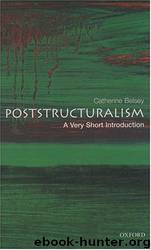Poststructuralism: A Very Short Introduction by Catherine Belsey

Author:Catherine Belsey
Language: eng
Format: mobi, epub
Tags: Aesthetics, Art, Structuralism, Philosophy, General, Post-Structuralism, Literary Criticism, Poststructuralism, History & Surveys, Poststructuralisme, Criticism & Theory, Movements
ISBN: 9780192801807
Publisher: Oxford University Press
Published: 2002-01-14T23:00:00+00:00
6. The goddess of love is subject to desire.
Venus Blindfolding Cupid shows the goddess of love punishing her son for shooting his arrows apparently at random. Ironically, her action is only likely to make things worse: a blind Cupid will surely act even more anarchically. But Venus does not appear to be concentrating on her task. She looks off to the left, apparently at nothing in particular, her expression suggesting that her daydream does not give her much satisfaction. Meanwhile, the other winged putto looks sadly over her shoulder, perhaps pitying Cupid, or possibly foreseeing his own fate.
Maybe Venus herself is the victim of Cupid’s arrow here. It wouldn’t be the first time. In Shakespeare’s narrative poem Venus and Adonis, she falls in love with the beautiful but indifferent Adonis, who prefers hunting. The poem draws attention to the paradox of her role: ‘She’s love, she loves, and yet she is not loved’. As the goddess of love, Venus is not only the supreme object of desire, but its subject too, capable of more than mortal longings. The poem ends by making the story into a fable of the origin of desire’s pain. Disappointed, Venus curses love, and as the personification of the condition, she has the power to make her curse come true. From now on, she announces, passion will always be full of anguish.
Lacan thought so too. There is, he insisted, no such thing as perfect sexual rapport. But the desire he saw as an inevitable component of the human condition was not necessarily erotic. In Lacanian theory it is not some fundamental sexual imperative that motivates desire, but the loss of the real, which leaves an incompleteness, a lack. We can see, Lacan argues, how sexual relationships come to ‘occupy’ the field of desire, since they involve the signifier at its most lyrical, as well as the organism at its most sensitive, but they are not its source. Indeed, they are not its solution either, since the signifier and the organism often pull in different directions.
Download
Poststructuralism: A Very Short Introduction by Catherine Belsey.epub
This site does not store any files on its server. We only index and link to content provided by other sites. Please contact the content providers to delete copyright contents if any and email us, we'll remove relevant links or contents immediately.
| Deconstruction | Existentialism |
| Humanism | Phenomenology |
| Pragmatism | Rationalism |
| Structuralism | Transcendentalism |
| Utilitarianism |
The remains of the day by Kazuo Ishiguro(7537)
Tools of Titans by Timothy Ferriss(6930)
The Black Swan by Nassim Nicholas Taleb(6179)
Inner Engineering: A Yogi's Guide to Joy by Sadhguru(5884)
Giovanni's Room by James Baldwin(5868)
The Way of Zen by Alan W. Watts(5785)
The Six Wives Of Henry VIII (WOMEN IN HISTORY) by Fraser Antonia(4784)
The Power of Now: A Guide to Spiritual Enlightenment by Eckhart Tolle(4745)
Astrophysics for People in a Hurry by Neil DeGrasse Tyson(4612)
Asking the Right Questions: A Guide to Critical Thinking by M. Neil Browne & Stuart M. Keeley(4557)
12 Rules for Life by Jordan B. Peterson(3721)
The Ethical Slut by Janet W. Hardy(3491)
Skin in the Game by Nassim Nicholas Taleb(3453)
Housekeeping by Marilynne Robinson(3394)
The Art of Happiness by The Dalai Lama(3375)
Double Down (Diary of a Wimpy Kid Book 11) by Jeff Kinney(3264)
Skin in the Game: Hidden Asymmetries in Daily Life by Nassim Nicholas Taleb(3257)
Walking by Henry David Thoreau(3227)
12 Rules for Life: An Antidote to Chaos by Jordan B. Peterson(3195)
